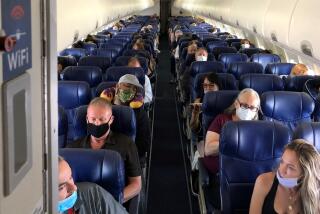Punishing of Nations Lax in Air Security Urged
- Share via
MONTREAL — The International Civil Aviation Organization was told Thursday that it should consider punishing countries that fail to provide adequate measures for air safety or encourage or take part in terrorism.
The proposals were advanced by British and Canadian officials. Elizabeth Hanford Dole, the U.S. secretary of transportation, also spoke to the 33-member council of the ICAO, a U.N. agency, but she did not go beyond American proposals that have already been made for tightening airport security and reviewing international airline security practices and standards.
It was the Canadian minister of transport, Donald Mazankowski, and the British minister of aviation, Michael Spicer, who gave the meeting its most dramatic moments.
Referring to an Air-India plane that crashed in the Atlantic last Sunday with the loss of 329 passengers and crew, the hijacking of a TWA plane by Lebanese extremists and several other recent terrorist acts, Mazankowski said that governments should ask whether “airline services should be continued to destinations where an adequate level of security is not maintained.”
‘Immediate Action’
Spicer was even more direct, pointing out that there is an international agreement that calls on governments to “take immediate action to cease all flights” to countries that do not act against hijackers or refuse to return hijacked aircraft.
Despite the Spicer and Mazankowski appeals, most of the discussion was taken up with statements about the increased danger to airline passengers and calling for a review of what went wrong.
“This is a time for concerted effort and courage throughout the world,” Dole said in her brief speech. “We must act with all the strength and unity we can draw together. We must send international terrorists and their sponsors a clear message that we will never appease them. We must, in short, prevail, or else our children will inherit a world of infernal barbarism.”
She said that under the direction of President Reagan, her department has ordered an increase in the number of federal marshals on airplanes. In addition, she said, curbside baggage check-in for international flights will be eliminated, systems will be installed to match luggage to passengers, and all freight and mail that is not subjected to X-ray examination or physical inspection will be held for 24 hours.
She also urged that more international attention be paid to preventing terrorism and called for “an immediate and intense review of existing practices for security of aircraft, baggage and cargo.”
Stronger Moves Sought
In Washington, Norman J. Philion, president of the Air Transport Assn., which represents 30 U.S. airlines, endorsed Dole’s remarks but called for further government action. Philion called in a statement for “further multinational agreement to establish prompt, appropriate sanctions for nations that give comfort to perpetrators of these crimes.”
Dole did not specify what nations have not lived up to existing standards and commitments. But she repeated previous Reagan Administration complaints that Greece had been lax in security before the TWA plane was seized on a flight from Athens to Rome.
She said that no other country where American airlines fly “would rise to the problems of Greece.”
Dole also declined to be specific about long-term measures, particularly any that might have political implications. She said detailed responses should await national and international studies that have been undertaken as a result of the recent incidents.
Canada’s Mazankowski, too, was vague when pressed, at a news conference, about why he and other delegates would not say when the current reviews would be completed, what new steps would be taken at airports or what countries are guilty of failing to protect airlines and their passengers.
He did say that new methods might include the use of detection devices on planes and an inspection of checked luggage just as it is put on a plane.
Spicer, the British minister, was the most specific about both technical preventive steps and political actions. Pointing out that ICAO action in the past has helped bring dramatic reductions in hijackings, he called for new efforts to get ahead of the technological sophistication in explosives and timing devices.
He told reporters after his speech, “It is proper that you ask me, a politician, about the political questions involved.” He was referring to countries that have provided a haven for hijackers.
“The recent success of hijackers in reaching safe havens is a matter of the utmost importance and clearly encourages others to make civil aviation a target,” he said. “It is most probable that the recent hijackings and other tragic incidents might not have occurred had all member states concerned followed exactly the provisions” of existing agreements outlining security provisions, including commitments to extradite or punish hijackers, guarantee the safety of passengers and aircraft and return all captured items.
His recommendation, he told reporters, is that “those nations who don’t abide by the rules be excluded from the club (meaning international organizations) and possibly be excluded from all air trade.”
Lack of Cooperation
But Spicer acknowledged that the largest obstacle to carrying out such measures is a lack of international cooperation and commitment.
“It won’t do any good to do these things bilaterally,” he said.
The Soviet delegate, Valery A. Sinjushkin, said his government “supports any effective measures that are adopted.”
But he emphasized the use of technological measures, and he said that any new programs must not “go beyond the frame of reference” of existing agreements.
On Capitol Hill, a federal aviation official said security procedures at Athens airport were so lax in February when a U.S. inspection team visited that it amounted to “almost an invitation” to hijackers.
Billie H. Vincent, the Transportation Department’s director of civil aviation security, said no warning was issued to travelers before the TWA hijacking because Greece had agreed after a seven-hour meeting with U.S. officials to upgrade security.
More to Read
Sign up for Essential California
The most important California stories and recommendations in your inbox every morning.
You may occasionally receive promotional content from the Los Angeles Times.










